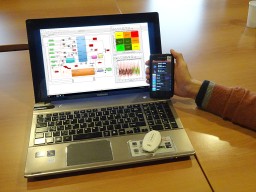 Diabetes is a chronic metabolic disorder which is caused by either the failure of the body to produce insulin (Type 1 Diabetes - T1D) or the inability of the body to respond adequately to circulating insulin (Type 2 Diabetes - T2D). Diabetes treatment is complex and aims at reducing the risk of both short- (e.g. hypo- and hyperglycaemia) and long-term complications (e.g. retinopathy, coronary heart disease, nephropathy, peripheral vascular disease, neuropathy, cerebrovascular disease) by keeping the blood glucose concentration in the near normal range (glucose control). Essential component of diabetes management is the optimisation and personalisation of treatment (e.g. insulin, other medication, diet, physical activity). Scope of our research in the development of new algorithms that allow the optimisation and personalisation of glucose control. To this end we are working on
Diabetes is a chronic metabolic disorder which is caused by either the failure of the body to produce insulin (Type 1 Diabetes - T1D) or the inability of the body to respond adequately to circulating insulin (Type 2 Diabetes - T2D). Diabetes treatment is complex and aims at reducing the risk of both short- (e.g. hypo- and hyperglycaemia) and long-term complications (e.g. retinopathy, coronary heart disease, nephropathy, peripheral vascular disease, neuropathy, cerebrovascular disease) by keeping the blood glucose concentration in the near normal range (glucose control). Essential component of diabetes management is the optimisation and personalisation of treatment (e.g. insulin, other medication, diet, physical activity). Scope of our research in the development of new algorithms that allow the optimisation and personalisation of glucose control. To this end we are working on
- an innovative algorithmic approach that allows daily adjustment of the insulin infusion profile (basal and bolus dose) on the basis of the fluctuations in the patient’s glucose. Information from SMBG or CGM provides input to the algorithms, which outputs the basal daily insulin and three insulin-to-carbohydrate ratios per day – one value for each of the three main meals. The algorithm is based on reinforcement learning, a type of AI which teaches systems to learn. The self-learning approach is adaptable and personalises daily insulin values to ensure glucose control, despite the inter- and intra-patient variabilities. The approach is data-driven, real-time and of low computational cost. To validate the newly introduced algorithm, the FDA-approved diabetes simulator was used. Over the course of virtual trials that lasted three months each and under extreme scenarios for disturbances, uncertainties and variabilities, the algorithm was able to achieve glucose control using both CGM and SMBG.
- AI approaches for predicting hypo- and hyperglycaemic conditions. It is our highest priority to provide a solution that can predict the onset of hypo- and hyper-glycaemia at least 30 min in advance, so that the patient can take actions and prevent the onset of the condition.
Research funded by Innosuisse and JDRF (See also http://mytreat.ch/)